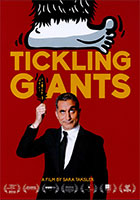
Tickling Giants 2016
Distributed by Tugg, Inc., 855-321-8844
Produced by Sara Taksler, Frederic Rose, Maziar Bahari, Monica Hampton
Directed by Sara Taksler
DVD, color, 119 min.
College - General Adult
Arab Spring, Censorship, Civil Disobedience, Democracy, Humor, Mass Media, Political Rights
Date Entered: 02/26/2018
Reviewed by Phil Salvador, American University Library, American UniversityEgyptian political comedian Bassem Youssef meets his idol Jon Stewart three times in Tickling Giants – first as a fan, then as a peer, and finally as an equal. Youssef, a former heart surgeon, started a political satire television show in 2011 in the wake of President Hosni Mubarak's resignation. His journey into acclaim, notoriety, and danger makes for a compelling portrait of courageous speech under pressure, though the film avoids drawing a broader conclusion from his story.
The documentary focuses on how Youssef’s television program (perfectly titled, The Show) acted as a release valve for Egypt’s political frustration. Behind the scenes, the production staff talks about how much they believe in the value of satire as a weapon and the importance of freedom of expression. Segments shot on the streets of Cairo demonstrate the widespread public support for Youssef, especially at a large rally in his defense after the government took legal action against him.
Although this is a great story about free speech, the first half is mostly a celebratory biography. Everything changes once Egypt plunges into military control. Suddenly Youssef is seen as an agitator who threatens the social order for criticizing a popular leader. Protestors call for his death. Staff members’ families are threatened. Youssef’s confidence wavers as he realizes the danger he is courting by continuing to produce The Show. It feels like the television studio is under siege.
These are the most shocking, insightful parts of Tickling Giants. What happens to political bravery when it’s threatened? The film gets close to Youssef’s discomfort. "I started to understand,” he admits in an interview, “why people under the pressure of being a celebrity can actually have suicidal thoughts."
The film touches briefly on the frustrations over the failure to build on the Arab Spring movement, but mostly, it depicts the ground-level view of the challenges Youssef and his team face. This documentary is recommended for studies of Arab media, political speech, or television production.